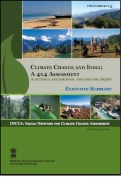Research Papers
On the brink: Water governance in the Yamuna river basin in Haryana
Posted on 08 Dec, 2010 10:07 PMThis study attempts to develop a case study of the Western Yamuna Canal Command in Haryana with the purpose of developing a general picture of the institutional environment and arrangements related to water resource development and use in the State of Haryana. It is based on a review of water law, policy and administration and helps draw conclusions on whether the existing governance systems are meeting the current needs and suggests alternate options. The study has attempted to test the following hypothesis –
India - Water resources management sector review - World Bank (1998)
Posted on 08 Dec, 2010 05:20 PMThis background report on Rural Water Supply and Sanitation by the World Bank, as a part of the Water Resources Management sector review, dwells on the policy and constraints of this sector, institutional and financial issues related to sector reform process and advocates an approach/plan to bring about radical reforms in the sector.
Climate change and India - A sectoral and regional analysis for 2030s by the Indian Network for Climate Change Assessment (INCCA)
Posted on 05 Dec, 2010 10:45 AM This report prepared by the Indian Network for Climate Change Assessment (INCCA) provides an assessment of impact of climate change in 2030s on four key sectors of the Indian economy, namely agriculture, water, natural ecosystems & biodiversity and health in four climate sensitive regions of India, namely the Himalayan region, the Western Ghats, the Coastal Area and the North-East Region. This is the for the first time that such a comprehensive, long term assessment has been undertaken based on rigorous scientific analysis for the 2030s (all previous assessments were for the 2070s and beyond).
This report prepared by the Indian Network for Climate Change Assessment (INCCA) provides an assessment of impact of climate change in 2030s on four key sectors of the Indian economy, namely agriculture, water, natural ecosystems & biodiversity and health in four climate sensitive regions of India, namely the Himalayan region, the Western Ghats, the Coastal Area and the North-East Region. This is the for the first time that such a comprehensive, long term assessment has been undertaken based on rigorous scientific analysis for the 2030s (all previous assessments were for the 2070s and beyond).
Water security for India: The external dynamics - An IDSA Task Force Report
Posted on 01 Dec, 2010 08:44 PMThe report by Institute for Defence Studies and Analyses is premised on the fact that India is facing a serious water resource problem and is expected to become 'water stressed' by 2025 and 'water scarce' by 2050. It raises fundamental questions about the forces driving water demand and the political dynamics of riparian relations, both in terms of hindrances and opportunities, amongst states in the subcontinent. Rivers, a crucial source of water resources, physically link upstream and downstream users and at the same time create barriers.
Seasonal changes in Indian aerosols: Updates from Earth Observatory
Posted on 25 Nov, 2010 12:49 PMIn recent years, scientists have detected very high levels of aerosol pollution in the air over India. Some of it is the result of industrial and agricultural activity, and some of it is nature at work.
Water Supply and Sanitation: India Assessment – A WHO-UNICEF sponsored study by the Planning Commission of India
Posted on 19 Nov, 2010 08:52 PMThis country-level report on the assessment of drinking water supply and sanitation in India is the result of a collaborative exercise between the Planning Commission of India, the World Health Organization (WHO), and the
Water treatment - Extended user testing of water treatment devices in Andhra Pradesh - A research paper by PATH
Posted on 16 Nov, 2010 12:12 AMIn this research paper, PATH hopes to identify, adapt and develop water treatment devices and business models for water treatment devices for the ecnomically weaker sections of society.
Evaluation of sanitation and wastewater treatment technologies: Case studies from India
Posted on 15 Nov, 2010 11:52 PMThe sanitation systems studied are spread across the country. The study goes to Pratapnagar in Bihar to evaluate the success of the septic tank to Asalthpur in Uttar Pradesh to study the Ecosan (UDDT) toilet. Other locations in India include Maharashtra, Gujarat, Kerala.
Rating system for water efficient fixtures - Survey by Centre for Science and Environment (2010)
Posted on 15 Nov, 2010 11:26 PMWater use in buildings, accounts for a high percentage of overall water use in cities. With development and growth there has been an increasing demand for water in India. There has been a mismatch between supply and demand because of distribution losses, changing lifestyles etc leading to situations of conflict. Developing water fixtures that use water efficiently is key to reducing this mismatch.
Watershed development in India: Biophysical and societal impacts - Research paper from Environ Dev Sustain journal
Posted on 15 Nov, 2010 11:12 PMThe paper argues that watershed management has to be fluid to take into consideration new realities like change in flow conditions, external realities like unintended impacts and the need to maintain minimum downstream flows for environmental and other purposes.